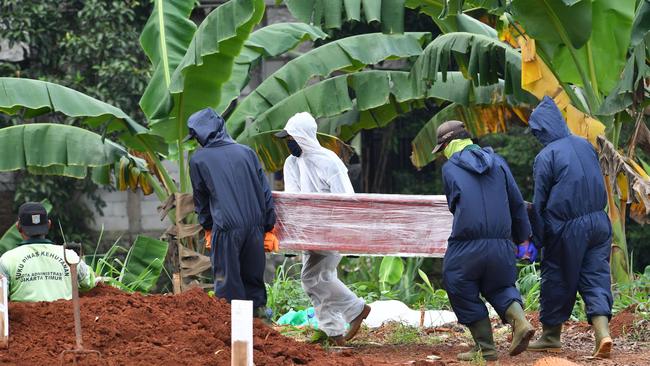Coronavirus: Jakarta hospitals at point of collapse
In Jakarta families with critically ill relatives search for vacant intensive care unit beds that no longer exist.

What does a health system in collapse look like?
In Jakarta, Indonesia’s sprawling capital of more than 10 million people, it is manifesting as a desperate, daily search by families with critically ill relatives for vacant intensive care beds that no longer exist.
Three days into the new year, a 50-year-old man from Depok, a satellite city on Jakarta’s southern fringe, reportedly died of COVID-19 in a Grab taxi as he struggled for breath beside his daughter. They had just left the 10th hospital to turn him away that day, and never made it to the 11th.
Irma Hidayana, co-founder of Indonesia’s LaporCOVID-19 data reporting centre, told The Australian the family had contacted her organisation after the eighth hospital rejection and her team had been trying to find him a place when he died. The volunteer organisation, which collates and disseminates data on the country’s pandemic, said it had been fielding similar calls for months and the city’s hospital system had finally collapsed under the strain.
On Monday, Tuesday and Wednesday, Dr Irma and her team contacted up to 70 hospitals a day in the greater Jakarta area urgently seeking ICU beds for families.
“Normally if you go to the hospital and it is determined that you’re in a critical condition and need to be moved to better facilities, the hospital would find a place for you,” she said. “Now hospitals are telling families they can’t help them and they have to find an ICU bed for themselves.”
Until December, LaporCOVID-19 was largely successful in finding beds “but since Christmas our success rate has been very low … Now the hospitals are telling us they have no spare ICU or emergency beds and if patients come there, they will be on a waiting list.
“The system is collapsed. One of the indicators is you see people physically standing — or sitting — in line trying to enter a hospital. That is happening now.”
Dr Irma said she knew of a number of families that had been forced to queue with critically ill relatives outside hospitals, only to eventually give up and take their relatives home.
Erlina Burhan, a lung specialist at Jakarta’s Persahabatan hospital — the city’s largest COVID referral clinic — said that reports of waiting lists for emergency and ICU beds were real and that “the hospitals are overloaded”.
Akmal Tahir, a professor of medicine and urologist who quit the national COVID-19 taskforce last year citing insufficient effort to address the crisis, told The Australian that there was no definition of a collapsed health system, but it was “safe to say that in Jakarta hospitals are overburdened and overloaded”.
“Many are left untreated because the system is unable to cope with the current growth of infections,” Professor Akmal said.
Jakarta deputy governor Ahmad Riza Patria conceded this week the rate at which the administration could bring new COVID-19 facilities online was being outstripped by the speed with which the virus was spreading through Jakarta.
Deaths and daily infections have peaked in the past week, with more people dying in Jakarta of COVID-19 between January 11 and 17 than in any other six-day period since the beginning of the pandemic. The city’s mortality rate — 361 deaths per million — is now highest in the country.
Between December 28 and January 17, Jakarta recorded 575 COVID-19 deaths. An extra 1173 suspected deaths were not added to the nation’s official COVID-19 death toll, now at more than 27,000, the World Health Organisation noted in its regular Indonesia report this week.
The WHO puts the city’s hospitalisation rate at more than 88 per cent, while the Jakarta government says at least 87 per cent of its allocated 8890 COVID-19 ICU and isolation beds are occupied. Many medics fear a further deterioration in coming weeks.
Across Indonesia last Sunday, the ratio of Indonesians testing positive for COVID-19 peaked at one in every three tested.
The Indonesian government has begun vaccinating 1.3 million health workers, though it is expected to take well over a year — perhaps two or three — to vaccinate 181 million of its 270 million population.
Pandu Riono, one of Indonesia’s top epidemiologists, says he too believes Jakarta’s health system has collapsed and the only way to ease the pressure is to enforce the sort of strict lockdown the government has firmly rejected for fear millions of daily wage earners could starve.
“People are dying in the emergency rooms, or in their homes,” Dr Pandu said. “I don’t know why there’s no emergency response from the government about this situation. It’s like they don’t care anymore.”
Additional reporting: Chandni Vasandani




To join the conversation, please log in. Don't have an account? Register
Join the conversation, you are commenting as Logout